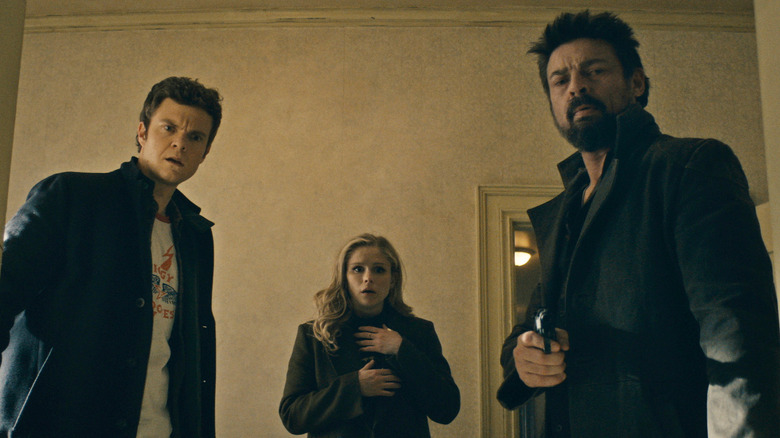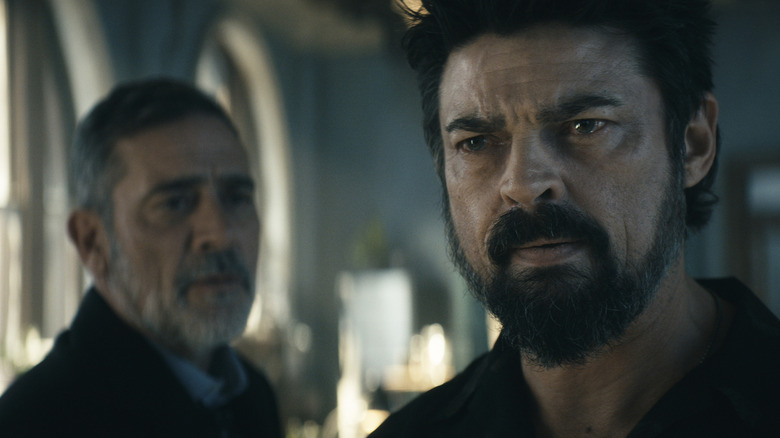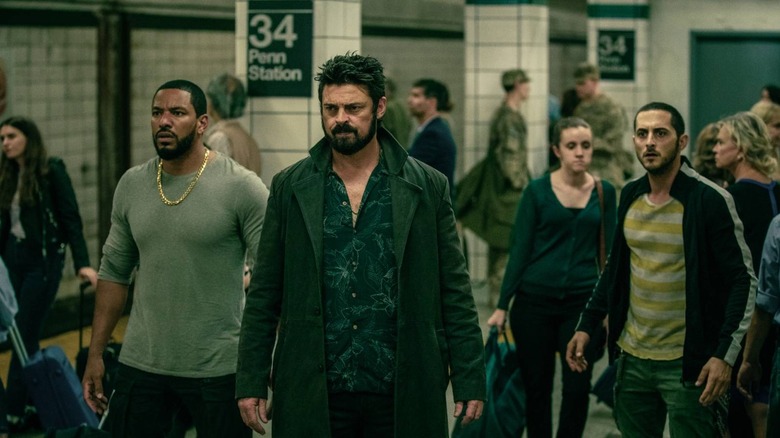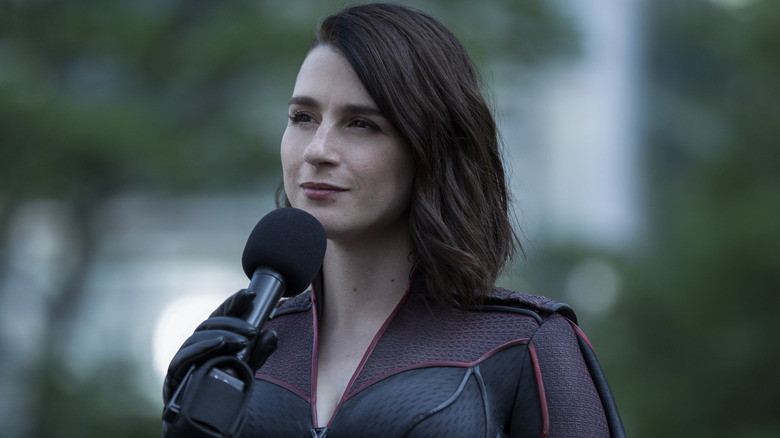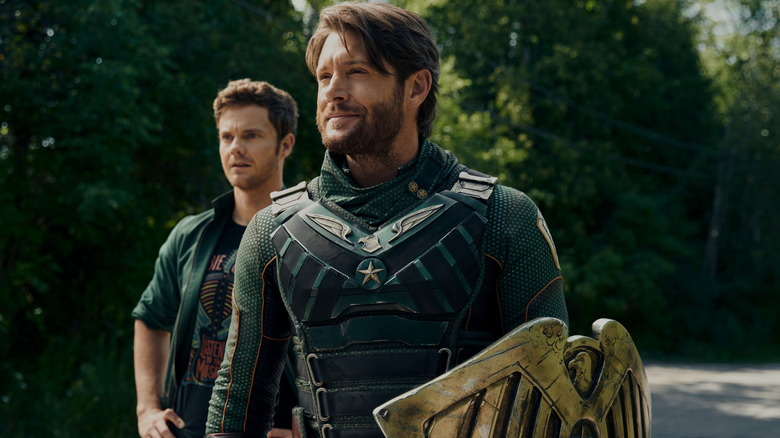Every Season Of The Boys Ranked
For some time it looked like Marvel Studios and DC Films would fight over comic book adaptation supremacy, until Prime Video threw down a superhero challenge of its own. Going against the grain in an offensive but brilliantly original fashion was "The Boys," the show that turned heroes into villains and the idea of super-powered people in a real world into the stuff of nightmares.
Billy Butcher (Karl Urban) leading a team of rough-around-the-edges whistleblowers against the establishment and the costumed crimefighters it's been pushing out has deservedly become one of the most watched shows on the Amazon streaming service. But even with the incredible talent of Antony Starr, Erin Moriarty and Jack Quaid, to name a few, just which season of this uncouth adventure is the best of the bunch?
Picking through the bones of this comic book story that's anything but family-friendly, we've ranked each chapter of "The Boys" from worst to best. Where can you put the season that had The Deep's massive whaling accident? How does Butcher's mental breakdown fare against the arrival of Stormfront? And can any other show top the Termite taking one bump too many in the very first episode? Put the kettle on, grab a cup of tea, and enjoy our ranking of "The Boys," Seasons 1-4, that contains absolutely no swearing. Honest.
4. Season 4
If there's one thing tougher than making sure a final season sticks the landing of the show, it's ensuring that the penultimate one does more than simply tread water before leading into the inevitable. That's the issue that "The Boys" encountered and couldn't quite shake in its fourth season, which had key characters aimlessly moving around the board before setting up what feels like "The Boys" answer to "Avengers: Endgame."
By doing so, it also led a superhero show — that's flown in the face of the genre it loves to rib so much — to inadvertently fall victim to the tropes they've made for themselves in the process. Dressing the show up with cameos, excessive gore, and even more offensive gags than before took center stage over more important and woefully overlooked elements like character development and just decent storytelling.
Instead, plot points such as Hughie (Jack Quaid) mourning the loss of his father and being sexually assaulted for laughs in the space of a single episode left fans furious at creator Eric Kripke. There was also the "Fight Club"-like twist involving Butcher and Joe Kessler (Jeffrey Dean Morgan) that will stand as one of the most unnecessary and controversial moments not just in Season 4, but in the show's history, all while Homelander continues just being ... bad? It's all well and good that the final season needs a warm-up act, but it needed to be hotter and sharper than the one we ended up with.
3. Season 1
For some, putting the premiere season of this bloody, swear-filled superhero show in the bottom half of this list would be blasphemy. The opening gambit of "The Boys" proved to its audience that even after the dark, gritty superhero movies and shows they'd seen up until this point, Eric Kripke's take on the genre could push things even further and laugh while doing so. Thanks to failed dolphin rescues, super-babies used like AK-47s and an airborne hostage situation that would haunt the show and audiences for some time, Season 1 deserves credit for laying the groundwork.
It also introduced us to two characters that would carry it since the beginning. Antony Starr's American super-powered psychopath Homelander was perfect opposite Karl Urban as the man bent on stopping him, encapsulated in one scene that has become a fan favorite. As a massive crowd looks up to the so-called heroes, Butcher looks the other way, peeking between the cracks at his only target. This is the standoff between the two sides of the same deranged and dented coin that would continue to thrive from that moment on.
No one from either side was safe with these two around, confirmed in the season finale that saw Madelyn Stillwell (Elisabeth Shue) get clipped in her own kitchen in horrific and excessively hot fashion. Even with all that said, while Season 1 tested the formula of an effed-up superhero show, Season 2 perfected it.
2. Season 2
If Season 1 opened the door to this world of not-so-super heroes, Season 2 let us wander around in it and learn it contained even more heinous characters than expected. Homelander and his unhinged view of his own superiority gave way to Stormfront (Aya Cash), who still stands as one of the best characters in the entire series. A very different version from the Stormfront in the comics, Cash's psychopathic villain was a kind of crazy that left even Homelander doing a second take. But that still didn't stop Antony Starr from fleshing out The Seven's leading lunatic and giving us an even more detailed and deranged insight into what made Homelander tick.
If Season 1 was a trial run for the show and its characters, Season 2 cemented the fact that Starr was giving us what might be one of the greatest TV villains in history. Dreaming of decimating crowds with his heat vision and having moments alone with trips to the farm, Starr really didn't waste a drop of screen time in that red, white and blue suit, making him a bad guy that was too good to ignore.
Throw in the head-exploding entry of Victoria Neuman (Claudia Doumit), an exploding whale, plus Starfire (Erin Moriarty), Queen Maeve (Dominique McElligott) and Kimiko (Karen Fukuhara) proving girls really do get it done, and Season 2 of "The Boys" planted the show in the conversation of being one of the best comic book adaptations ever.
1. Season 3
Two words explain perfectly just why Season 3 of "The Boys" belongs at the top of the list for Amazon's wonderfully offensive superhero show: "Scorched earth." Even in its first episode, Eric Kripke turned the dial up not only in the jaw-dropping superhero shenanigans (see Termite's private mishap if you absolutely have to) but also in applying all the tropes the show has so much fun mocking to focus on its biggest draw: Billy Butcher fighting Homelander.
With Episode 1 hosting a private chat between the two, it sets up a showdown that reverberates with the same hair-raising energy of Iron Man and Thanos, Superman and Zod, or Batman and The Joker. When the two finally do come to blows, it's air-thumpingly good superhero stuff, leaning into the comic book genre in the middle of an abandoned orgy, because where else?
This, along with the added power of Jensen Ackles' effortlessly brilliant Soldier Boy and Hughie standing on his own two feet against even Homelander himself (hilarious as that might be), makes Season 3 something special. Not only does it hold a middle finger to the genre that has been traversing rocky territory in a post-"Avengers: Endgame" era, but it continues to poke the political bear even more by making Vought's poster boy and his following analogous to another well-known, big-haired blonde that many see as a leader. In a series that cuts close to the bone of real events so crudely, Season 3 breaks it apart and cooks the gooey marrow inside.
